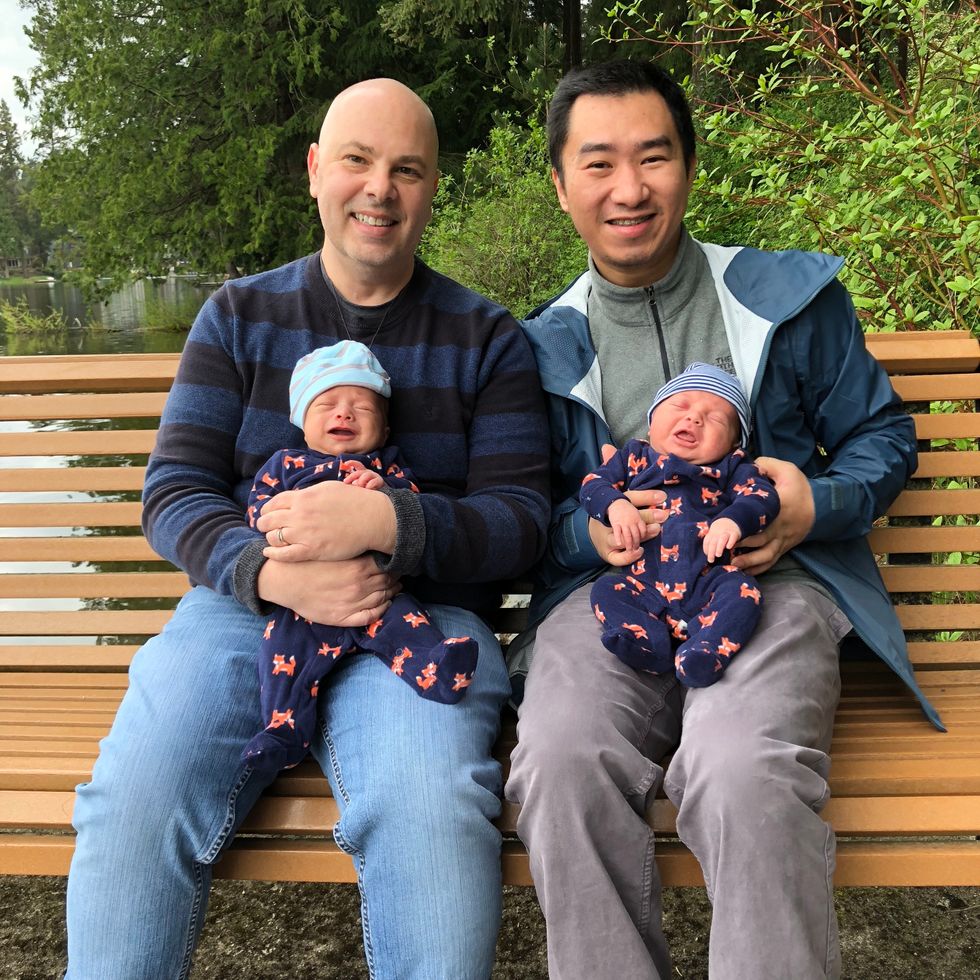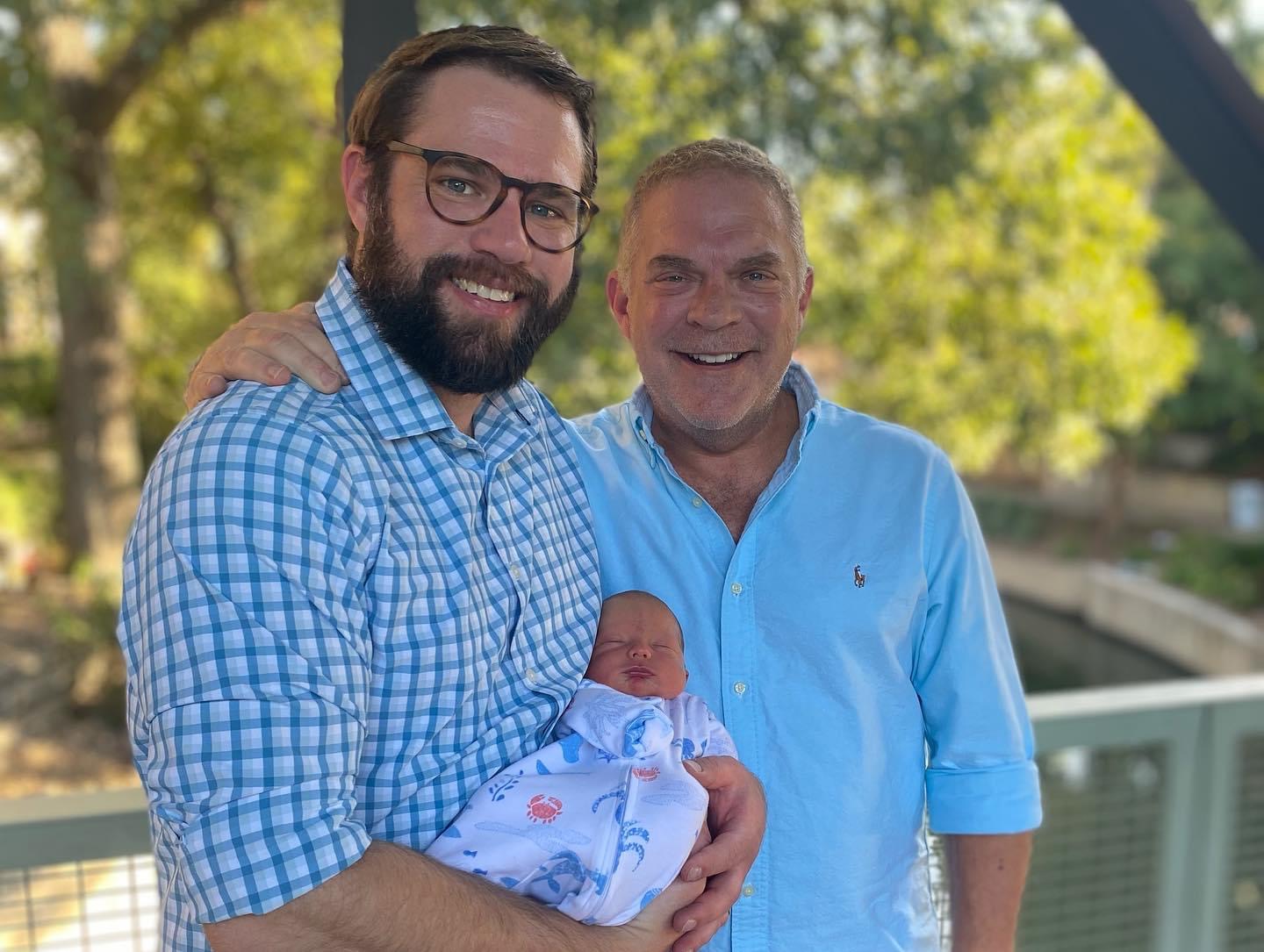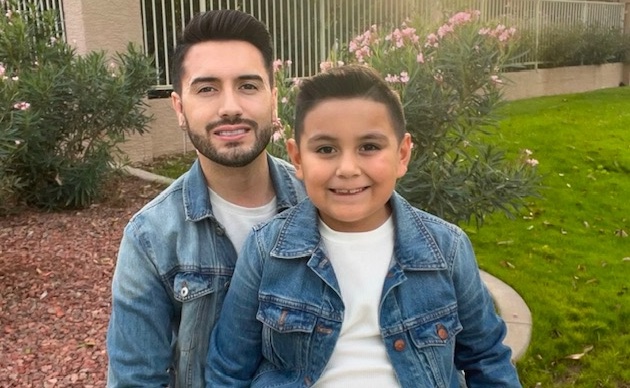In the months before their son was born this past November, Mauricio and Stephen should have been busy luxuriating in the anxieties familiar to every new dad: worrying if you’ve misassembled the baby furniture; stressing about baby names; and debating whether to re-gift the extra copies of “Goodnight Moon” every new parent is inevitably given.
Instead the husbands, whose daughter was still many years from her first algebra class, were preoccupied with solving a math question: how the hell were they going to add up enough days off of work to care for their adopted newborn?
“Ultimately, we were fortunate,” Mauricio said. “We negotiated ahead of time for vacation days that allowed us both to stay at home for three weeks after our daughter was born.”
Unlike the vast majority of American employers, Mauricio and Stephen’s jobs do, in fact, offer some form of paid leave to some new parents—but only to moms who have given birth. But new dads and adoptive parents? You’re out of luck. So after spending three weeks of their “vacation” time caring for their newborn daughter in the days after her birth, the couple dutifully returned to work, entrusting the care of their daughter to a stranger.
“Financially speaking, the early return to work forced us to get help at home to take care of our newborn, which is not affordable,” Mauricio said. “Emotionally, it is hard to leave a three-week-old newborn at home to the care of someone you just hired.”
***
Unfortunately, Mauricio and Stephens’s predicament is part of a much larger national embarrassment: the United States is the only country, besides Papua New Guinea, without some form of a national paid family leave policy. Only 14% of workers in the United States have access to such a benefit.
In Europe, meanwhile, policymakers—already content with the coverage they provide new moms—have moved on to improving leave policies aimed just at fathers. If Mauricio and Stephen lived in Sweden, for instance, they would each be eligible for 90 pays of paid leave. In Iceland, meanwhile, the new dads would have been guaranteed 90 days, in addition to another 90 days split between them, however they saw fit.
Just in case you’re not yet packing your bags for Europe, this last example should do the trick: a company in Italy recently granted an employee paid time off to care for a sick dog.
“It’s illegal to separate kittens and puppies from their parents at a much later date than what we expect from parents in the United States,” said Brianna Cayo Cotte, Chief of Staff for PL+US, a nonprofit working to expand paid leave policies across the country. “Yet we expect people to be back to work less than two weeks after they become new parents. That’s just crazy.”
Fortunately, Brianna says PL+US has seen something of a sea change in recent years regarding the ways American workers and businesses are viewing parental leave policies.
“A growing change is happening where millennial men expect to be equal parenting partners,” she explained. But, she explained, unequal workplace policies can make it difficult for men to fill that role. As a result, “we’re seeing paid leave become more of an expectation.”
This cultural shift, prompted by tireless organizing efforts, is clearly having an impact. According to a yearly survey conducted by PL+US, over one-third of top U.S. employers have improved upon their paid family leave policies in the past two years.
On the federal level, advocates are still pushing for the enactment of Senator Kristin Gillibrand’s FAMILY Act, which would guarantee 12 weeks of partial income to every new parent, regardless of gender or birth status. But paid leave advocates are not merely waiting for Congressional winds to blow in their favor—paid leave bills have been introduced in 17 states this year, hopefully adding to the five that currently have policies in place.
Private companies are also doing their part. Beginning this Father’s Day, Dove Men+Care has teamed up with Gays With Kids and others to champion paternity leave for all dads, and challenge the stereotypes around men as caregivers. The recently launched campaign, #DearFutureDads, seeks to spark a cultural movement that not only increases access but also utilization to paid paternity leave policies. According to recent research by Promundo-US and Dove Men+Care, 73% of dads agree there is little workplace support for fathers, and one in five men stated they were afraid of losing their job if they took the full amount of paternity leave offered.
“By supporting this important initiative, our goal is to increase utilization rates of paid paternity leave for those men who have access to it and encourage other companies to come together,” said Nick Soukas, VP of Skin Cleansing & Baby Care for Unilever. “We also hope to encourage other companies to come together and offer men paid paternity leave so they can take the time to care for their families.
***
Though change in corporate America is on the horizon, far too many corporate policies, Brianna says, remain unresponsive to the specific needs of LGBTQ people, who often come to parenthood in unique ways. Overwhelming, companies still give little to no leave for men and adoptive parents.
“We have usual families,” said Brianna. “The caregiving LGBT families need to provide might not fit into traditional structure, and a really progressive policy will recognize that.”
Matt and Richard, new fathers to twin boys as of this past March, have recently confronted an inflexible work policy. Matt’s employer, an insurance company based in California, offers no paid leave to new dads. They do, however, offer benefits to new adoptive parents—two weeks paid leave and a $4,000 stipend to offset legal fees.
Though Matt and Richard’s sons were born via surrogacy, they figured they were still eligible for the adoption benefits. Matt and Richard are each biologically related to just one of the twins, meaning the men had to undergo adoption proceedings—with all the associated stressors and costs—to become the legal guardian of their non-biological son.
But when Matt applied for the adoption benefits at his job, he was denied on the grounds that his situation was not a “typical” adoption process.

Matt (left) with husband Richard (right) and newborn twins
“It’s surprising because I work for a very inclusive company,” Matt said, who lives with his family outside of Seattle, Washington. “They know I’m gay and that I was having kids. No one ever had a problem with it.”
Matt was lucky to have about two weeks worth of vacation days left in the year. In order to cobble together a full month of leave, he also took an additional two weeks of unpaid leave guaranteed to him under the Family Medical Leave Act (FMLA), currently the country’s only guaranteed form of family leave.
“Two weeks unpaid was not insignificant,” Matt said. “That’s half a month’s salary not going to support my family.”
After only a month, Matt returned to work, leaving his husband, Richard, alone to care for their newborn twins during the day.
“They were still eating every three hours when I went back to work,” Matt said. “If I had been able to stay at home for longer, to get down to the point when it was just once a night, it would have made a huge difference in all of our lives.”
***
As more generous family leave policies are beginning to take hold in the United States, ones that are truly inclusive continue to be a blind spot for companies—even for companies that are otherwise regarded as LGBTQ friendly.
So, what can be done about it?
“A growing mantra in our office is ‘ask and advocate,'” said Brianna. “You won’t change anything without trying.”
In January 2017, Starbucks announced it would begin offering six weeks of fully paid parental leave to its hourly workers. But like so many other company policies, the expansion would only benefit birth mothers, leaving fathers and adoptive parents out of the mix.
Over the last year, however, a group of employees, led by several LGBTQ workers, began organizing and pushing the company to adopt a more equitable policy. Their efforts quickly paid off; in less than a year, Starbucks announced it was once again amending its policy to include fathers and adoptive parents.
“LGBTQ parents are among the most likely to be left out of these policies, so they can also be some of the strongest and most persuasive voices for change,” Brianna said. “LGBTQ people are organized. They know how to ask for things when they’re not getting it; they know how to escalate.”
PL+US has even recently launched an online workshop to help new parents interested in changing company policies do so with some tried and proven tools.
Matt, for his part, seemed unsure when I asked whether he planned to push for a policy change at his own work. And who could blame him for simply wanting to move on with his life? He and his family suffered an injustice. But he still has twin newborns to raise, a job to do and a husband to love. How was he supposed to fit in time for what could turn into a protracted battle at work?
“Doing all that while also taking care of newborn twins wouldn’t be easy in any way,” he said. “But doing nothing doesn’t seem right, either. This is discrimination, and something needs to change.”






